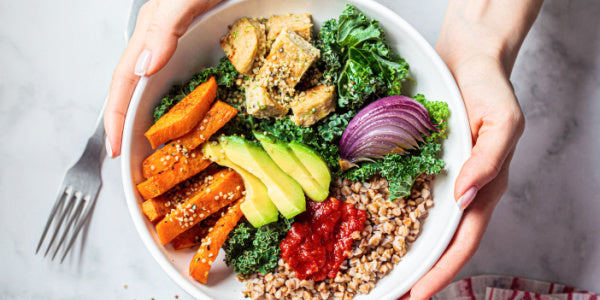
Wondering how to lose weight on a vegetarian diet? While ultra-processed foods can sideline your goals, nutrient-rich plant foods can increase the effectiveness of a vegetarian diet for weight loss.
Keep reading for tips on using vegetarian diets to lose weight, including tactics you can try today!
What's a Vegetarian Diet?
Vegetarian diets, as the name suggests, focus mostly on veggies while avoiding animal products. The diet comprises mostly plant-based foods, although many different kinds of vegetarians exist.
For example, lacto-ovo vegetarians eat milk, dairy products, and eggs but avoid meat. Pescatarians don't eat meat but eat fish. Flexitarians are even more flexible, eating mostly meatless but enjoying animal products here and there.
The "right" kind of vegetarian diet is often up to personal preference. Some people opt to include foods like eggs in their vegetarian diet to get the necessary nutrients. Others avoid animal byproducts—like honey and gelatin—to completely comply with a vegan or vegetarian lifestyle.
Can You Follow a Vegetarian Diet for Weight Loss?
Following a vegetarian diet can be important for overall health and weight loss. Like any other healthy eating pattern, getting plenty of nutrient-rich foods is crucial to maintaining a healthy weight.
But it's important to understand vegetarianism doesn't always mean "healthy," and certain foods will lead to weight loss more than others.
Vegetarianism Doesn't Always Mean "Healthy"
Many people choose a plant-based diet because of its potential health benefits, such as reducing the risk of heart disease. However, not all food marked or marketed as "vegetarian" is healthy.
Some foods—like chips, crackers, and cookies—may technically be vegetarian, but contain unwanted saturated fats and added sugars. Inspecting the nutrition label or ingredients list can help you make an informed decision to support your weight loss journey.
Focus On Fiber & Protein Sources
Picking fiber and protein-rich vegetarian foods is a great way to encourage weight loss. Plant-based proteins are more likely to contain high fiber levels and low saturated fats (or no saturated fats). Plus, adequate fiber and protein intake helps you feel full, meaning you'll be able to curb cravings.
Other ideas of what to include in your next meal include:
•Beans, peas, or lentils like chickpeas
•Greek yogurt
•Nuts or nut butter, including peanut butter and cashew
•Seeds and seed butter, such as sunflower butter
•Soy foods like tofu or tempeh
•Whole grains
How to Lose Weight on a Vegetarian Diet
Losing weight on a vegetarian diet starts with thoughtfully selecting your meal components. Then, finding mealtime solutions or working with a professional can help you make meaningful progress.
Don't know where to start? Try these tips when you're switching to plant-based foods.
Pick a Variety of Nutrient-Rich Foods
When planning vegetarian meals, variety is imperative. Eating a wide range of different foods makes it more likely that you'll get all the nutrients you need from your food.
Contrary to popular belief, achieving variety doesn't require much planning! One easy way to get a higher variety of foods is to strive for a rainbow of colors on your plate. Generally, trying to plate as many different colors of foods as possible will ensure plenty of fruits and vegetables are included.
Practice Portion Control
Although it could go without saying, portion control is key to eating for weight loss. It's easy to scoop or serve more than average portions, even when eating mostly plant-based foods. Understanding the calorie intake of each serving can help you make more informed choices.
Monitor Progress
Monitoring progress is an important part of any weight loss journey. It allows an individual to track changes over the long term and celebrate meaningful milestones. Keep in mind that weighing yourself isn't the only way to track progress, and non-scale victories can be a reason to celebrate, too.
Work With a Professional
Feeling stuck? Working with a dietitian can help! Especially when eating plant-based, it's important to ensure you get enough nutrients.
A dietitian can help you create a meal plan that makes sense for your lifestyle, complete with plenty of vegetables.
Utilize Mealtime Solutions
If you're in a busy stage of life, bistroMD can be a simple solution. With many veggie-focused, fiber-rich, and high-protein meals, a bistroMD Vegan meal plan can help you manage your appetite.
The Last Word on a Vegetarian Diet for Weight Loss
Making sustainable weight loss changes starts with making smart food choices each day. Focusing more on plant-based foods and eating less meat may be a great way to align your lifestyle with your health goals.
Working with a dietitian or opting for a meal delivery service can help if you're feeling overwhelmed.
References:
Caspero A, Klemm S. Building a Healthy Vegetarian Diet: Myths and Facts. Eatright.org. Published October 2021.
Ellis E. Protein Foods for Your Vegetarian Child. Eatright.org. Published February 2018.
Klemm S. Vegetarianism: The Basic Facts. Eatright.org. Published October 2021.
Mayo Clinic Staff. Vegetarian diet: How to get the best nutrition. Mayoclinic.org. Published March 2023.
National Library of Medicine. Vegetarian Diet. Medlineplus.gov. Published April 2015.







